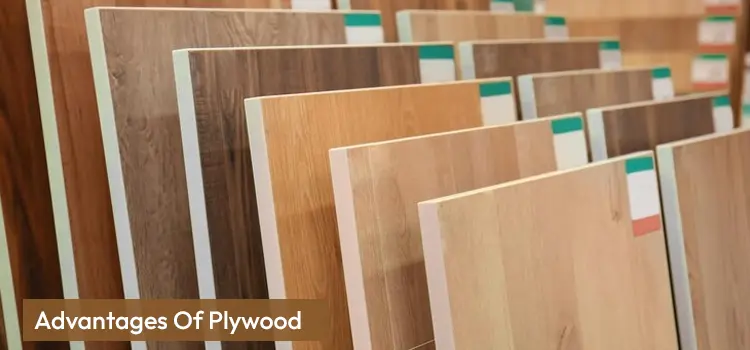Plywood is a versatile building material used in a variety of applications and is known for its strength, durability, and cost-effectiveness. Manufacturers focus on delivering high-quality plywood products that meet stringent standards for performance and reliability. This article explores the numerous advantages of plywood, highlighting why it is a preferred choice in the construction and woodworking industry.
10 Biggest Advantages Of Plywood
Plywood has several advantages over traditional solid wood and other engineered wood products. Here are some key advantages:
1. Superior Structural Integrity
One of the primary advantages of plywood is its superior structural integrity. Plywood is made by bonding multiple layers of wood veneers with the grain of each layer running in different directions. This cross-graining technique gives plywood enhanced strength and resistance to splitting, making it ideal for construction and furniture applications.
2. Load-Bearing Capacity
The load-bearing capacity of plywood is another significant advantage. This important plywood benefit makes reliable choice for flooring, roofing, and wall sheathing, where strength and stability are crucial.
3. Resistance To Impact
Plywood’s cross-laminated structure provides excellent resistance to impact, making it a preferred material for high-traffic areas and applications requiring durability.
4. Long Lifespan
Due to its construction, plywood has a long lifespan, offering lasting performance and reducing the need for frequent replacements, which is both cost-effective and environmentally friendly.
5. Dimensional Stability
One of the critical properties of plywood is its dimensional stability. Plywood maintains its shape and size better than solid wood, minimizing the risk of warping and shrinkage. This stability makes it a reliable material for long-term use in various environments.
6. Lightweight Yet Strong
Plywood is known for being lightweight yet strong. This combination of properties makes it easier to transport and handle during construction, without compromising on strength and durability.
7. Resistance to Cracking and Splitting
The cross-laminated structure of plywood gives it excellent resistance to cracking and splitting. This property is particularly beneficial in applications where the material is subjected to stress and impact.
8. Cost-Effective
Plywood is generally more cost-effective than solid wood. Its efficient use of wood veneers and ability to be produced in large quantities contribute to lower costs, making it an economical choice for many projects.
9. Aesthetic Appeal
Plywood comes in a variety of finishes and veneers, allowing for a range of aesthetic options. This flexibility makes it suitable for visible applications such as paneling, cabinetry, and furniture.
10. Environmental Sustainability
Plywood is an environmentally sustainable option compared to other materials. It utilizes wood veneers efficiently, reducing waste, and many manufacturers, including MRS Woodcraft, source their wood from responsibly managed forests.
Because of its versatility and durability, plywood is an ideal choice for construction and furniture. Its ability to withstand various environmental conditions and its ease of use make it a preferred material for a wide range of projects.
Advantages Of Different Types Of Plywood
Plywood offers several advantages over other wood materials. There are some key advantages of different types of plywood:
1. Advantages Of Plywood Formwork
Plywood formwork is widely used in construction due to its practical advantages:
- Cost-Effective: Plywood formwork is lightweight, easy to handle, and can be reused multiple times, reducing costs associated with formwork materials and labor.
- Smooth Surface Finish: It provides a smooth surface finish for concrete, ensuring a level and even appearance.
- Dimensional Stability: Plywood maintains its shape and size, ensuring the structural integrity of the concrete structure.
2. Marine Plywood Advantages
Marine plywood is designed for water exposure and offers several uses:
- Moisture Resistance: It is highly resistant to moisture and decay, making it ideal for marine environments.
- Durability: Marine plywood can withstand harsh weather conditions and prolonged exposure to water without delaminating.
- Strength: It provides strong structural support, crucial for boat building and docks.
- Longevity: Its durability ensures a long lifespan, reducing maintenance and replacement costs over time.
3. Birch Plywood Advantages
Birch plywood is favored in the furniture and cabinetry industry for its aesthetic and functional benefits:
- Smooth Surface and Consistent Thickness: It offers a smooth surface finish and consistent thickness, perfect for furniture making.
- Aesthetic Appeal: Birch plywood has a fine grain and attractive appearance, enhancing the visual appeal of finished products.
- Strength and Stability: It is strong and stable, providing reliable performance in structural applications.
- Versatility: It can be used for a wide range of applications, from high-end furniture to decorative paneling.
Conclusion
In conclusion, the numerous advantages of plywood make it an invaluable material for a wide range of applications. From construction and furniture making to marine and industrial uses, plywood advantages offer unmatched strength, durability, and versatility.
MRS Woodcraft is committed to providing top-quality multiple products that meet international standards and cater to diverse customer needs. Choose MRS Woodcraft for all your plywood requirements and experience the benefits of superior craftsmanship and reliable service.
Frequently Asked Questions
What Are The Advantages Of Using Birch Plywood In Cabinetry And Interior Applications?
Birch plywood is valued for its smooth surface, consistent thickness, and aesthetic appeal, making it ideal for high-end cabinetry, interior solutions, and decorative applications. It is strong, stable, and easy to work with.
Is Plywood Suitable For Use In Structural Applications?
Yes, plywood is commonly used in structural applications due to its strength, durability, and dimensional stability. It provides reliable support and structural integrity in flooring, roofing, walls, and formwork.
What Are The Advantages Of Using Plywood In Furniture Making?
Plywood benefits are valued in furniture making for their smooth surface finish, dimensional stability, and ease of workability. It offers a consistent thickness and can be shaped and veneered to create attractive and functional furniture pieces.
Can Plywood Be Used In Moist Environments?
Yes, certain types of plywood, such as marine plywood, are designed specifically for moist environments. They are resistant to moisture, decay, and insects, making them suitable for applications like boat building and outdoor furniture.

